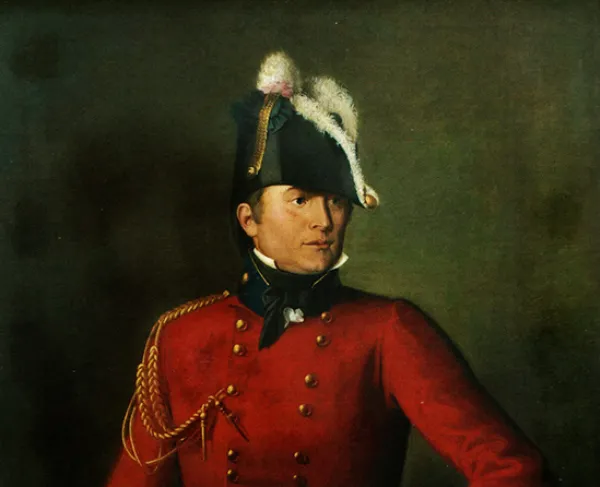Robert Ross

Robert Ross was an Irish-born officer in the British Army whose 25-year career included wars on three continents. Ross’s service was marked by gallantry, discipline, and several scrapes with danger, the last of which cost him his life in the fight for Baltimore in 1814.
Ross was born in County Down, Ireland, to Elizabeth Adderley and Major David Ross, a veteran of the Seven Years’ War. He attended Trinity College Dublin, graduating in 1784. Five years later, he received a commission as an ensign in the 25th Regiment of Foot. In the years that followed, he rose steadily through the ranks and, in 1799, promoted to major of the 20th Regiment of Foot, the unit he would be associated for most of his career.
With the 20th Regiment, Ross fought during the Napoleonic wars, beginning with the 1799 Anglo-Russo invasion of Holland. In his very first battle, the Battle of Krabbendam, he was severely wounded—the first of many close calls for the Irishman. He returned to duty in 1800 and persuaded men to volunteer for service in Egypt. There, the regiment distinguished itself with a bayonet charge at the Battle of Alexandria. As a reward for his service in Holland, Ross received a brevet promotion to lieutenant colonel in 1801. In 1803, he assumed command of the 20th and instilled in it a commitment to physical conditioning and discipline that remained a legacy within the regiment for decades. His “prompt display of gallantry” at the 1806 Battle of Maida earned him the admiration of his superiors and a gold medal. In 1808, he received a full promotion to lieutenant colonel and remained in command of the 20th through many battles and campaigns of the Spanish Peninsular War that followed, including the retreat to Corunna, where his rearguard action was a rare bright spot in an otherwise dim chapter in the British army’s history.
In the spring of 1813, Ross applied for and received command of a brigade that included his old regiment; that June he was promoted to major general. He led his brigade in several battles that followed, including Roncesvalle and Sauroren. The Duke of Wellington commended Ross and his brigade who “distinguished themselves in the Pyrenees beyond all former precedent.” Ross, who had already had two horses shot out from under him during this campaign, was wounded on February 27, 1814, at the Battle of Orthez. Though Ross downplayed the severity of the injury, he was disabled for the remainder of the Peninsular War. He returned home with the thanks of Parliament and was awarded the Peninsula gold cross.
With the war against Napoleon winding down, the British government determined to send four brigades from Europe to deal with the crisis in North America. One of these was to go to the east coast of the United States and “retaliate upon the Americans for the outrages which they had committed,” including the burning of the Canadian city of York (present-day Toronto). Ross was selected to command this expeditionary force and sailed to Bermuda in the summer of 1814. From there, Ross and his command of 4,500 infantry and marines embarked for the United States, landing on August 19, 1814.
After landing in the vicinity of Washington, D.C., Ross led a successful attack on U.S. forces at Bladensburg, easily brushing aside American militiamen and clearing the way for the British to enter the U.S. Capitol. Following orders from Vice Admiral Sir Alexander Cochrane and Rear Admiral George Cockburn, Ross ordered burning of the White House, Capitol building, and the Library of Congress. However, contrary to orders, Ross demanded that private property be respected, confining his damage to the public buildings of the U.S. Government and the bridge over the Potomac River. With the destruction complete, Ross re-embarked on August 30, making his way toward Baltimore.
Ross’s force landed at North Point, southeast of the city, early on the morning of September 12, 1814. The Americans had anticipated such a move and flooded the woods in that area with militiamen. Ross, who reportedly said he didn’t care it if “rained militia,” moved swiftly to disembark his troops and move inland. After a march of about two miles, American sharpshooters began to open fire. Ross turned in his saddle to bring up reinforcements, but was struck by a bullet that passed through his right arm and entered his chest. A surgeon was called for, but Ross’s wound was mortal; he died en route to the ships.
Ross was interred on British soil in Halifax, Nova Scotia, where a monument to him was also erected. Veterans of 20th Regiment erected a monument to Ross in his hometown of Rostrevor, County Down, and he is memorialized in St. Paul’s Cathedral in London.
Related Battles
213
291
200
250





